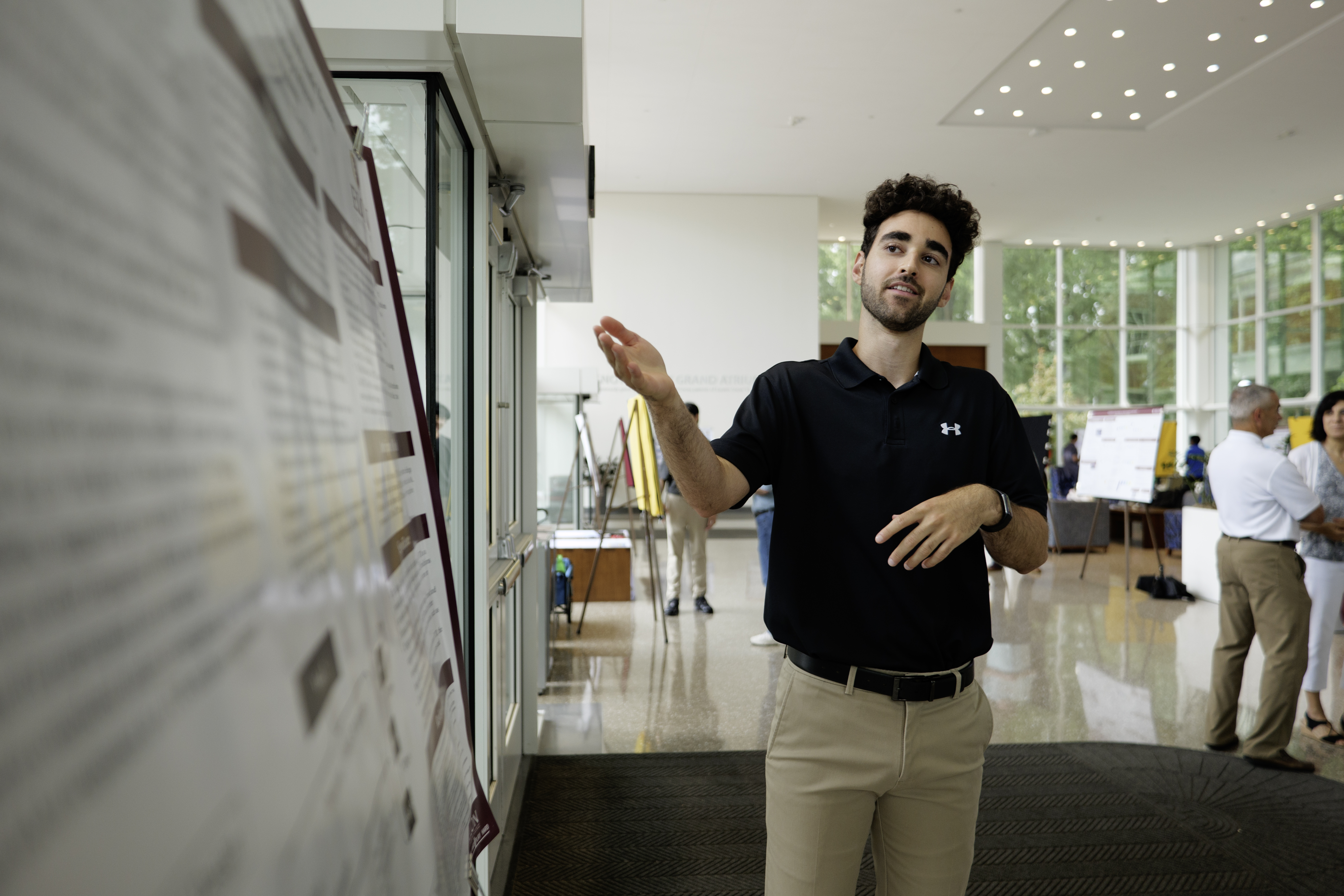Nearly 50 students participated in the Summer Undergraduate Research Experience, a unique opportunity where the topics are diverse, along with the personal stories behind them.
Elon University students participating in the Summer Undergraduate Research Experience (SURE) reached a major milestone in their eight-week journey with poster presentations held in the Snow Family Grand Atrium on Thursday, July 25. For many of the nearly 50 participating students, the presentations are not the end, but the beginning of their research career.
Changing the narrative
SURE is about more than just researching a topic – the students are exploring personal questions and interests that can spark wide-ranging, impactful conversations.
“I want to change the narrative,” said Fiona Hodge ‘26, whose research focuses on the intersectionality of queer college student identity.
Hodge, a psychology major and vice president of the Undergraduate Research Student Association (URSA) identifies as a member of the LBGTQ community and noticed a gap in the research around queer people.
“The previous research focused on discrimination and talking about queer people, but not focusing on their own perspectives,” said Hodge. “So, I want to provide research that’s by queer researchers for queer people.”
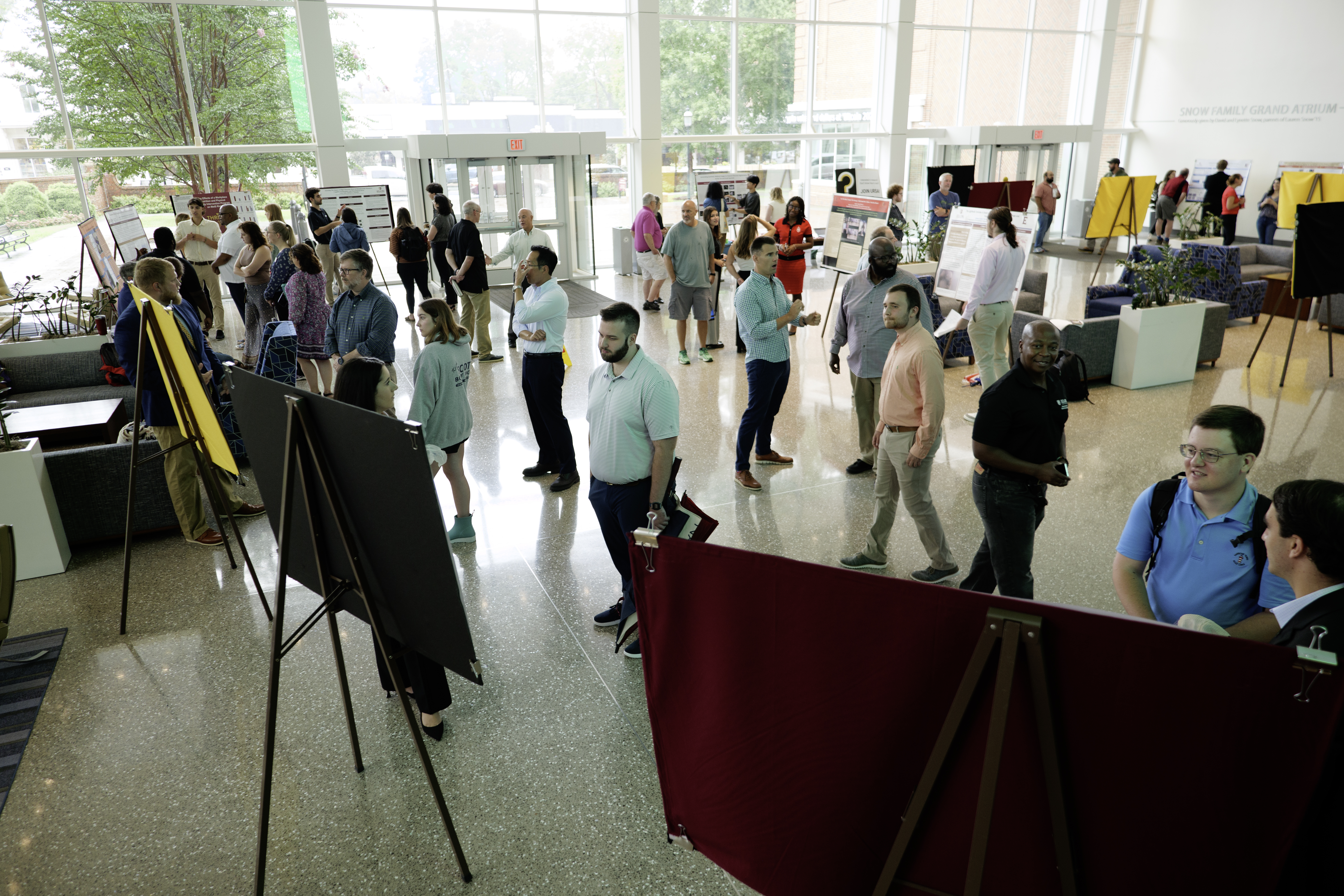
SURE provides an opportunity for students to work with faculty and gain meaningful research experience over the summer, without the pressure of other courses during a typical semester. Students apply for the opportunity, which usually takes place during the summer before the junior or senior year.
“Undergraduate research has been shown to have a lot of great benefits for students and faculty, thinking about developing critical thinking and communication skills, which is evident at the SURE presentations,” said Eric Hall, director of undergraduate research and interim assistant provost for scholarship and creative activity. “Presenting at conferences is the way we show our research findings, and this shows students what it would be like if they go to a regional or national conference.”
Hodge first started doing research this year and says the experience has gone well, especially with the help of her mentor Adam Kim, assistant professor of psychology.
“This is my first-time presenting research. I’m excited. It feels really cool to see your research come to life,” Hodge said. “My mentor pushes me to work harder and be more creative, to think outside of the box and not just come up with an okay question but with an interesting question.”
Queerness in the classroom
The child of two educators, a future teacher and a queer-identifying student, Lindsey Hefty ’25 also turned to her LGBTQ+ identity for research.
“I wanted to combine my major of elementary education with my minor in women’s, gender and sexualities studies with all the discourse surrounding queerness in schools. There’s been a lot of negativity,” said Hefty, who is also an Elon Teaching Fellow. “There is a lot of legislation that’s making it impossible for queer identifies to exist in educational spaces.”
The debate over LGBTQ+ issues in public schools has been a hot-button political issue in the last several years. In 2023, North Carolina passed the “Parents Bill of Rights,” which requires teachers to notify parents if a student questions their gender or uses different pronouns.
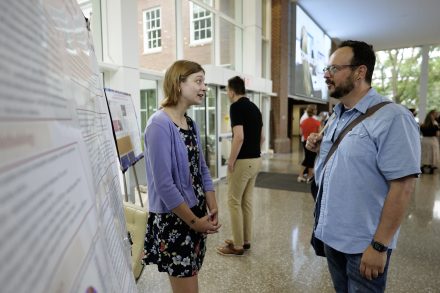
In collaboration with her mentor, Associate Professor of English and Chair of the Department of English Kevin Bourque, Hefty interviewed LGBTQ+ educators and fielded survey responses from across North Carolina.
“We are looking for less obvious ways that queerness is happening in the classroom, less safe space posters and more covert incorporations of identity, and that’s a lot of what we’ve found,” said Hefty. “It’s also been really inspiring to talk to other queer educators about their experiences and stories.”
Hefty said she and Bourque fit together well – both being queer-identifying and interested in further exploring queer studies.
“Lindsey has been a pleasure to work with: thoughtful, perceptive, creative, good-natured, smart and funny. I love how her research ties not only to her professional goals, but also her outlook on the world,” Bourque said.
Using research to help
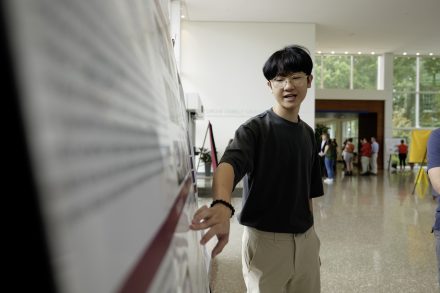
Research was one of the main reasons Natalie Peeples ’26 and Archie Tan ‘25 chose to attend Elon with undergraduate research being one of the Five Elon Experiences. Two of those experiences are needed for the Experiential Learning Requirement (ELR) to graduate. Students earn two ELRs for their participation in SURE.
Both Peeples and Tan are Lumen Scholars with their SURE research being an extension of that work as well. Tan, the president of URSA, is a computer science major researching using artificial intelligence to detect pancreatic cancer.
“Right now, technology is growing super-fast, even for the people in the field, it’s really hard to catch up,” said Tan, who is also a first-generation college student. “I want to help people utilize advanced technology in their daily life. I want to use the technology to help people.”
Peeples’ topic is helping people in a different way – looking at what she describes as an understudied area in childhood well-being. The psychology major is interviewing parents of four-to five-year-old children in the US and asking them about what they think is important for early childhood, later she will talk with parents in Denmark, comparing the two countries.
“Denmark and the U.S. focus on very different things when it comes to childhood,” said Peeples, who is also an Honors Fellow. “In Denmark, they are focused more on play and outdoor time, while in the US, the focus is more on academics.”
A good childhood
Finding the parents to interview has been easy for Peeples through the dance classes she teaches at Elon DanceWorks. Her mother is also a pre-school teacher. Her mentor Maureen Vandermaas-Peeler, professor of psychology and director of the Center for Research on Global Engagement, is helping to find parents in Denmark, which they will talk with over the next few months. Peeples plans to go to Denmark next summer to complete her Lumen and Honors thesis research.
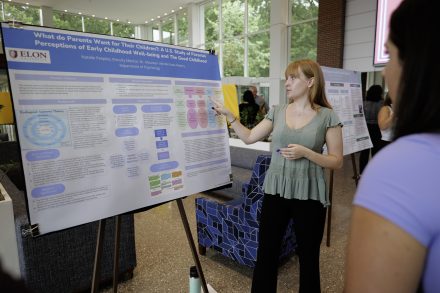
“My mentor has taught me about resilience and organization, while making sure that you take time for yourself, your own mental health and well-being because it can be draining trying to do all these things at once,” said Peeples.
The two began working together in fall 2023 and Vandermaas-Peeler says Peeples has enthusiastically embraced the project.
“She’s grown tremendously throughout these intensive weeks and SURE has been exceptional preparation for the next two years as Natalie explores these concepts in the U.S. and in Denmark,” Vandermaas-Peeler said. “I feel very fortunate to be in a mentoring relationship with Natalie and support her intellectual journey.”
What does it mean to believe?
Growing up Catholic, Kiara Cronin ‘25 is tapping into her perceptions of religion – looking at how others in her generation (Generation Z) view faith and spirituality, compared to Generation X.
“Spirituality can mean different things for different people,” said Cronin, who is majoring in human service studies. “I see people on social media saying they are spiritual but not religious or they believe in a higher power, but not necessarily God. I thought it was interesting how my generation is open about not subscribing to a certain religion and how that differs from someone in my mom’s generation.”
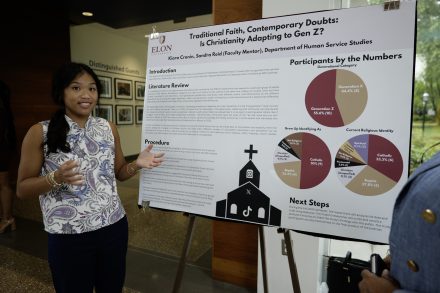
The project grew out of Cronin’s work as a Multifaith Scholar through the Center for the Study of Religion, Culture and Society, in collaboration with her mentor Senior Lecturer in Human Service Studies Sandra Reid. Cronin is also an Isabella Cannon Leadership Fellow and connected with Reid through the Disarming Injustice course which all the fellows are required to take, along with a Civil Rights Leadership Tour.
Cronin interviewed people about their thoughts on religion and spirituality and held focus groups on the topic. The culmination of the research will be a podcast miniseries about her findings.
“A surprising response from people is that they don’t want to get rid of the traditional ritual acts or traditional values, because that is what makes the church what it is,” she said. “But they do think, to some degree, there has to be some change in how the church interacts with young people.”
Just the start
Before this project, Cronin had never done an extensive research project, so she found the process intimidating at first, something Garrett Schmiederer ’25 can relate to.
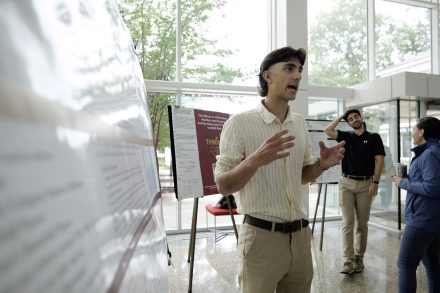
“It’s been time consuming, and difficult at times, but I’m enjoying it so far,” said Schmiederer, an exercise science major who hopes to become an athletic trainer. “I’ve always wanted to do research and it’s been a learning experience.”
Schmiederer’s topic looks at concussions in student athletes and their effect on headaches and sleep. His research is still developing, and he plans to have more data by the end of the fall semester and present at the Spring Undergraduate Research Forum in 2025.
“It’s just the start so far,” said Schmiderer. “I’m giving them an ImPACT test, which is a concussion baseline test and then after that I’m giving them a survey that is about quality of sleep, if they have headaches or migraines and how it’s affecting their quality of life.”
Schmiederer is mentored by Caroline Ketcham, associate dean of Elon College, the College of Arts and Sciences and professor of exercise science, and Hall, who is also his academic adviser.
“I’ve had a lot of success as a scholar myself, but I enjoy talking to students and working with them to develop something and see their success,” said Hall. “It’s amazing to see the topics and say ‘Wow that’s impressive,’ but then when you talk to the students at the presentations and they are able to translate what they’ve done to me, who’s not in their field, is really impressive.”



